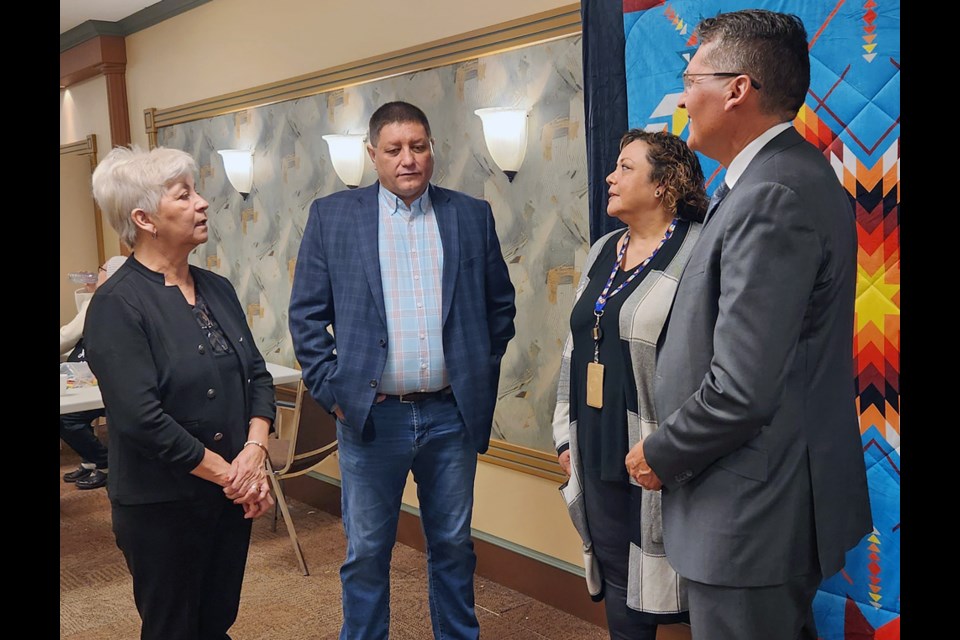SASKATOON — Saskatoon Tribal Council Chief Mark Arcand expressed gratitude towards the Saskatchewan Indian Gaming Authority for their $100,000 donation to help the Emergency Wellness Centre with its nutrition program.
The EWC provides shelter for homeless people, acts as a warming centre, provides meals to the hungry, and offers mental and addiction counselling. The donation will support three meals daily and snacks for those staying at the facility or who want to keep warm.
“It [nutrition program] is to support three meals a day and snacks. When you go inside the pods, there are fridges and microwaves. These are filled for anybody that wants to have a sandwich at 8 p.m. when the kitchen is closed,” said Arcand.
“They can make a sandwich or have coffee, apples, bananas, whatever they need. So this will support the initiative because we see how the cost of food is just rising. We have the provincial government as one funder and then we have partners — like SIGA — coming on board to help with the work that we are doing.”
Arcand also mentioned that the cost of food is rising and that the donation will help support their programs.
He thanked SIGA’s team — President and Chief Executive Officer Zane Hansen, Corporate Affairs Vice President Pat Cook, Corporate Social Responsibility Director Lillian Denton and their board — for their support to different communities in the province.
“Without their support, taking care of all the relatives here would not be possible. The $100,000 contribution is significant in keeping people safe in our community. I always say that Saskatoon is a good place because communities are coming together to help,” said Arcand.
“Supporting those with big needs inside our city is growing and we do not want homelessness to grow or poverty to grow. We want people to have a quality of life with contributions like this with SIGA as a corporate partner.”
Arcand said SIGA is one of the major businesses in the province. It is a First Nations corporation which employs more than 1,000 people in all of its Saskatchewan casinos that believe in giving back to the community.
“Organizations [SIGA] like this that other corporations should be following in their mandate of supporting good initiatives and ensuring that we are all serving a better purpose. That purpose is to help people,” said Arcand.
“When corporations like SIGA lead by example, we should applaud them because they don't have to do this. They want to do this because it's making a difference in people's lives and when they see an organization like [STC] 小蓝视频 transparent, they are happy to support it. We are happy they [SIGA] contribute and improve our community.”
He added that the provincial government provides a blanket funding agreement of about $4 million for the EWC's operations. Additional donations from the community and organizations like SIGA help support the EWC's needs, which include paying the utilities and salaries of specific staff.
“These extra donations from the community and organizations help support the [EWC’s] needs. It is a bigger budget than we think because food costs are increasing. We get it [meals] delivered right now because we do not have the space inside our facility,” said Arcand.
“Right now, the inflation of food is hurting [us]; it is hurting every family and [even] the people that are not here. Everybody in our city and our province in our country, food is going up tremendously. So, this [donation] is going to put a dent in supporting us [financially].”
The EWC plans to set up a commercial kitchen and hire relatives who want to work as cooks, which would help cut the cost of transporting meals prepared at the White Buffalo Youth Lodge and delivered thrice daily to the Fairmont Drive facility.
The Knights of Columbus’ Denis Mahoney Council (8215) also recently donated two large chest freezers, which Arcand said would help them build a commercial kitchen. They can now store frozen food in the freezers.
“Once we get our commercial kitchen going, we are going to put some of our relatives, whoever wants to work, through a food safety handling course and put them on our [STC] payroll so they can work here [EWC]. Then try to work themselves into [getting] their place and have a job to come to. It is about benefitting the whole program and ensuring that we are all working together,” said Arcand.





